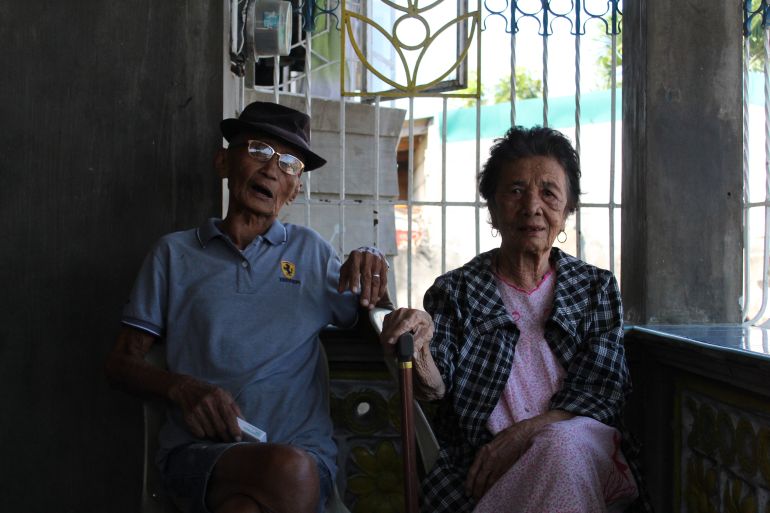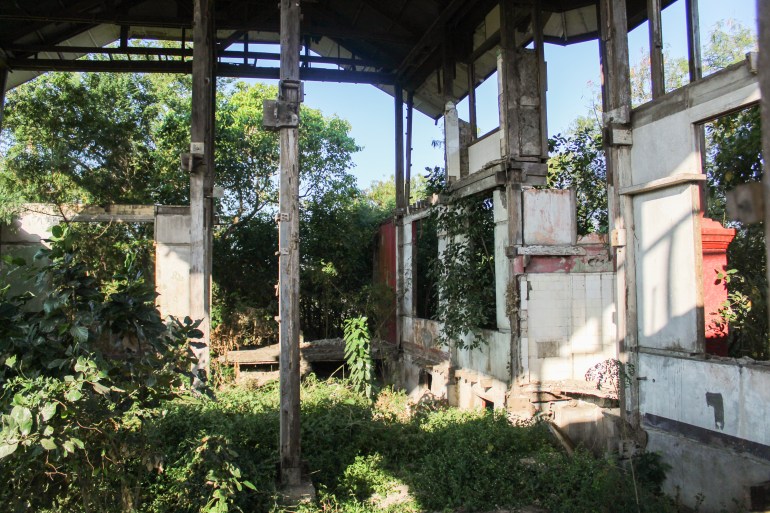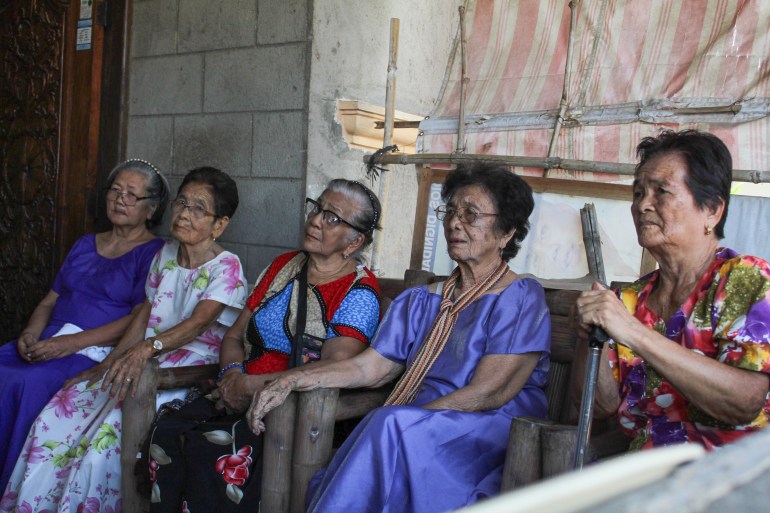Women in Philippines used as Japanese sex slaves demand justice
Philippine President Ferdinand Marcos Jr urged to ‘make a difference’ for now-elderly women after landmark UN decision.

Mapaniqui, Philippines – Last month, at the feast of St Joseph, 88-year-old Pilar Galang stood up to sing in front of a gathering in Mapaniqui, north of the Philippines capital Manila.
Galang rarely speaks these days but on that day, she found her voice.
Keep reading
list of 4 itemsPhilippines announces locations of 4 bases to be used by US army
Asia’s prices are on rise. In the Philippines, they’re soaring
Philippines’ Marcos to shut out ICC after losing drug-war appeal
Standing alongside other grandmothers and dressed in a baro’t saya, a traditional outfit, she belted out a scathing indictment of the Japanese soldiers who assaulted and raped her as well as many other Filipino women during World War II.
“They rounded up all the men they found and with ropes, they bound them to posts / They cocked their machine guns and not even one was left alive / They took all their corpses to a school and then they burned them / and after the punishment, they turned to the women / left and right, they dragged us and forced us to carry their belongings / to the Red House we were brought and made to suffer all the horrors,” Galang sang.
She and her fellow survivors composed the music and lyrics in honour of the United Nations finding that the Philippine government violated the rights of victims of sexual violence by Japanese soldiers during WWII by failing to fight for their cause.
“This is a landmark decision,” said Virginia Suarez, lawyer for the Malaya Lolas (Grandmothers of Freedom), which works with the abused women and that filed the complaint to the Committee on the Elimination of Discrimination against Women (CEDAW).
Suarez urged Philippine President Ferdinand Marcos Jr to finally “make a difference by doing something for our grandmothers and their families”.
In its March 8 decision, CEDAW recommended the Philippine government provide the victims with “full reparation, including recognition and redress, an official apology and material and moral damages, for the continuous discrimination that they suffered”.
In response, the Presidential Palace said that while “reparations have been made”, they would “study” the decision and issue a written response within six months.
But the victims also want action from Japan.

Maria Quilantang, 87, president of the Malaya Lolas, noted the CEDAW decision emphasised the accountability of the invading nation.
“We call on Japan and to those who came with the invasion still alive, and we’ve heard there are, if they have mercy in their hearts for the people they’ve hurt, we are old already and would still need your aid,” she said.
The Malaya Lolas is an organisation for women from Mapaniqui – a town targeted during the war as a hotbed for anti-Japanese armed group activity. For three days in November 1944, Japanese soldiers bombed and burned the town before looting the homes of residents and torturing men in front of their families.
Testifying at the Women’s International War Crimes Tribunal on Japan’s Military Sexual Slavery in 2000, Tarcila Sampang recalled seeing soldiers cut off her father’s penis and make him eat it.
The soldiers took more than 100 young girls, women and elderly to the “Bahay na Pula,” (Red House) where they were systematically raped, according to evidence provided to the tribunal.
About 200,000 women and young girls across the region were subjected to sexual slavery – euphemistically known as the comfort system – the tribunal found. A UN expert found in 1996 that the abuses amounted to “crimes against humanity” and some activists and groups including the United States Institute for Peace put the number of victims closer to 500,000.
Many have died before seeing justice.
When Malaya Lolas was founded in 1997, there were 96 survivors. Now there are just 21.
A week after the CEDAW decision, 97-year-old Hilaria Bustamante died at home. During the war, Japanese soldiers kept her in garrison where she said they raped her multiple times each night.
In 1993, she sued the Japanese government at a Tokyo District Court only for the charges to be dismissed.
“The Japanese won’t accept that they committed a crime,” Bustamante’s daughter Teresita Marasigan told Al Jazeera. “How shall we wait for the apology and compensation? Can we still claim it, will we be willing to wait even longer?”
Reparations questioned
The Philippines is not the only country in Asia where women were forced into sexual slavery during the Japanese occupation. Women in South Korea have been among the most vocal campaigners for justice and reparations. A UN expert found in 1996 that some 200,000 women had been forced to work in Japanese military brothels in abuses that amounted to “crimes against humanity”.
While the ordeals of Filipino victims of such crimes only became public in the late ’80s and early ’90s, Manila has continued to insist that reparations were afforded under the 1951 San Francisco Peace Treaty, echoing the position of the Japanese government.
“The grandmothers are in their twilight and yet we still have no urgency from the government. The reparation treaty simply refers to economic damage and structural damage. It was belatedly discovered that a sex slave system was maintained,” said Suarez.
In 2010, the Supreme Court dismissed a petition by the Malaya Lolas to compel the Philippine government to demand reparations and a formal apology from the Japanese. Eight years later, Philippine authorities removed a monument to the “comfort women” after Japanese officials complained.
Sharon Cabusao of Lila Pilipina, a national organisation of “comfort women” expressed dismay at how the Philippines continues to “act like a puppet to Japan instead of standing up for the honour and dignity of Filipino women”.
Between 1995 and 2007, the Japanese government offered the Asian Women’s Fund (AWF) for victims of the war, made up of public resources combined with donations from Japanese citizens. Beneficiaries also received apologies from individual state officials.

Cabusao said that was insufficient.
“The fund came from Japanese citizens,” she told Al Jazeera. “Thus we cannot regard the AWF as official compensation. Private apologies contained therein are not official apologies and do not bind any of the succeeding Japanese governments to uphold.”
Suarez also criticised the AWF for excluding Mapaniqui women because they were not exploited for an extended period. What became known as the “Rape of Mapaniqui” lasted only a few days. “Are victims of mass rape seen as lesser victims?” said Suarez.
Indai Sajor, senior gender adviser at the UN Inter-Agency Standing Committee for humanitarian response in New York, has been working with several civil society groups on the issue of “comfort women” since 1992. She does not think Japan’s position will change anytime soon.
“The most important is that the women can internally have peace with themselves,” she told Al Jazeera. “The women are heroes – for coming out, for fighting one of the strongest countries in the world is, in itself, justice.”
When Marcos Jr visited Japan in February, he ignored calls by women’s groups for him to take up the cause of sexual slavery when he met Prime Minister Kishida Fumio.
After the visit, Japan announced it was looking to forge new military agreements with the Philippines and the US amid heightened tensions in the region over disputed islands and the contested South China Sea.
In Mapaniqui, Pilar Galang reached the end of her song.
The pain of what happened to her all those years ago was evident as her voice cracked.
Quilantang sat beside Galang, cupping her teary face in her hands. The crowd of relatives, neighbours and visitors to the historic town listened intently.
“The Malaya Lolas are growing old and our strength is gone / Without support what will become of us, our wounds may never heal,” Galang sang.
After a few moments, the crowd, visibly moved, offered cheers of support and empathy. Nearly 80 years after Japan was defeated, the increasingly elderly women and their families have not lost hope for justice.